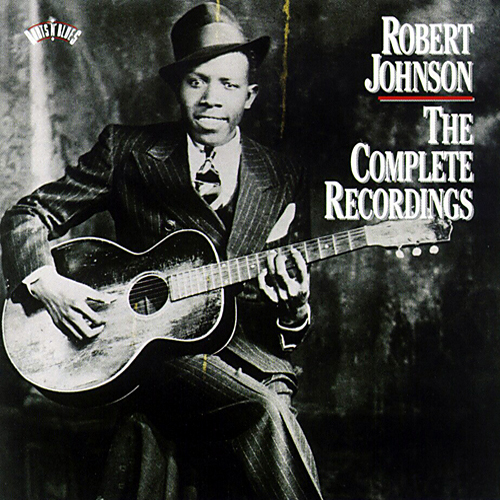5. Robert JohnsonThe Complete Recordings

I discovered Robert Johnson quite late, about ten years ago. I’d heard the remakes like Led Zeppelin and Eric Clapton versions and stuff by The Rolling Stones and hearing first from English bluesmen, I didn’t think much of them, ‘cause I’ve got a thing about English bluesmen [laughs]! I have a kind of negative view of them! But had it not been for them, we wouldn’t have heard of Robert Johnson. God bless the English bluesmen [laughs]!
But finally I was directed to the source, but when I heard the Robert Johnson recordings – and I have a version that’s been cleaned up quite a bit with all the latest digital technology that takes out a lot of the scratches and hiss and all that – to hear the reverb in the actual hotel room in which he sat and played these songs is just breathtaking! This man actually walked on the planet and I think that Robert Johnson was genius; a double genius! You know, if McCartney is a genius, if Lennon was a genius then I would say Robert Johnson is a double genius! We have to get a new star system here!
But those songs that he wrote on a banged up old acoustic guitar – and the action must have been about a half-inch off the frets – and he came up with these beautiful – like Joni Mitchell – little orchestrations that you have to kind of remind yourself that you’re only listening to one man and one guitar. And those arrangements are so full and of course his voice is so soulful and this is absolutely no gimmickry. Robert Johnson restores my faith that there are people out there, artists who you can take into a studio and they are virtually perfect. You don’t have to fix too many things. There was no fixing with Robert Johnson; he was what you get with him.
I can play Robert Johnson all day long, the same 26 songs, and I’ll never get tired of them. You can imagine that if you saw him in a club he could play any version because he was always evolving. It’s a pity he didn’t live longer and move to a big city. From what I’ve read, he loved being evasive and living in the shadows. He had a female addiction, he drank and of course all those things collided and killed him too early. But what he left behind was truly legendary.


